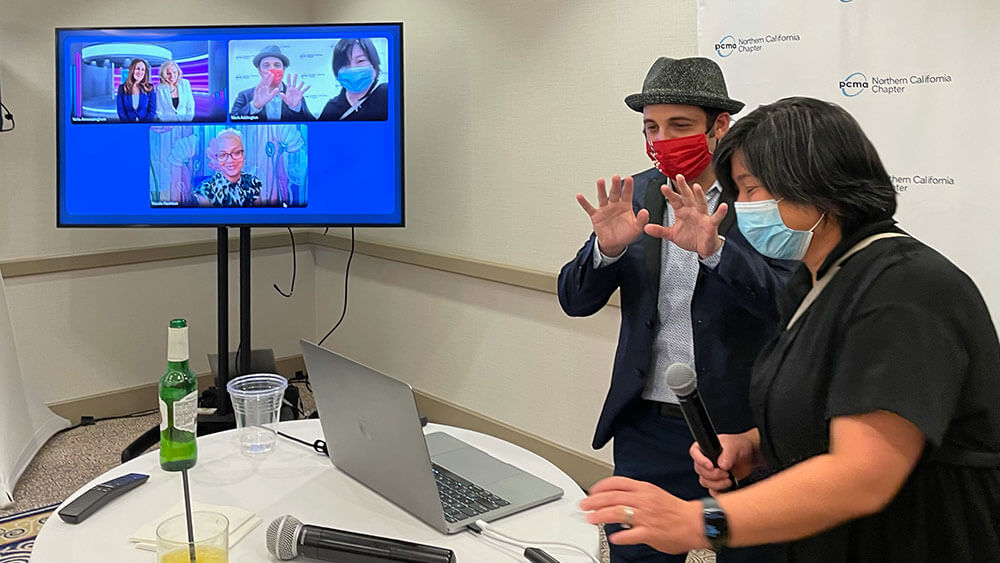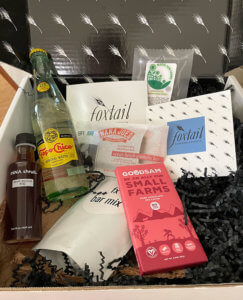
Andrew Verducci (left), founder and CEO of Verducci Event Productions, and Rahnee Palma, chief sales officer at FACE2FACE Meetings, take part in the PCMA’s Northern California chapter’s LEAP hybrid conference.
In March, when PCMA’s Northern California chapter hosted a webinar about hybrid events, the most-asked question, said programs committee member Velia Amarasingham, was, “How do we engage both virtual and in-person guests simultaneously?” As a business events industry association, “we felt,” she said, “it was our responsibility to answer the question.”
The chapter’s response came May 20, in the form LEAP, a one-day hybrid conference, which 34 participants experienced remotely through a virtual platform and — in the case of a few dozen — in person at the Renaissance Walnut Creek Hotel, in Walnut Creek, California.
The conference theme, “360 Wellness for Optimal Success,” was designed as a kind of a reset for meeting professionals, as the restrictions on travel and the size of in-person meetings begins to recede in California, among other states. Nearly 16 months in, the challenges that the pandemic have brought to our physical and mental wellbeing are evident, Amarasingham said. “We aren’t moving around as much as we used to, and mental wellness — well, I don’t need to explain that,” she said. “We wanted to bring in a third element — business wellness.” Over the last year, “so many people in our industry have been furloughed or lost their jobs or, as business owners, have had to pivot.”

LEAP participants received a box from Foxtail Catering and Events filled with snacks and drinks aligned with the wellness theme.
Amarasingham and her business partner, Heather Rogers, fit into that last category. The pair — who are best friends, entertainers, and experience designers — cofounded Curated Entertainment to provide emcee services and variety entertainment to live events, but had to shift their focus to digital events last May. As the event’s emcees, the duo leaned into their backgrounds in comedy, storytelling, and theater — presenters have to work triple-hard to keep participants engaged online, Amarasingham said. “Humor and narrative through lines are a good way to keep people on the edge of their seats.”
The conference began as a digital broadcast on the Goldcast platform. During the first segment, Patrick Hamilton, senior event planner for Foxtail Catering and Events in San Francisco, explained how the company shifted from catering in-person corporate events to creating custom boxes for digital events and other ventures — LEAP participants received a box from Foxtail filled with snacks and drinks aligned with the wellness theme. The company began as an underground supper club in San Francisco and the emphasis on storytelling has remained as part of the company DNA, Hamilton said. The contents of the box — including granola bars, a chocolate bar, beef jerky, and a “mocktail” kit — were produced by small, local, and in many cases, women-owned businesses in San Francisco, and the packaging was fully compostable and recyclable, Hamilton said. The pandemic has given the company, which Hamilton described as “chef-centric,” the opportunity “to enter the event realm with fresh eyes,” he said. As in-person and hybrid events ramp up, Hamilton expects custom boxes to stick around because they can give event participants a way to share the same experience, wherever in the world they may be.
As the founder of a successful hotel chain, a former Airbnb executive, and author of five books, Chip Conley is an expert in business strategy and surviving market fluctuations. In Conley’s keynote on mental wellness, he shared stories about how he learned to redefine success and cultivate emotional stability through the many ups and downs of his three-decades-long career. “Ninety-eight percent of people’s anxiety comes from two variables: how uncertain they feel and how powerless they feel,” Conley said. “Frankly, in difficult times the best thing you can do for people you work with is provide as much transparency as possible.”
To counter anxiety, Conley recommended creating what he called an “anxiety balance sheet.” On a piece of paper or spreadsheet, create four columns, where you list 1) the things that you are uncertain about and 2) the things that you are certain about, followed by a list of 3) the things you have no influence over and 4) the things you can control. Through that exercise, “what you come to realize is that you have more knowledge about things and more control than you thought you did,” Conley said. “And just the act of making things more tangible takes you out of free-floating anxiety.” (Please click twice to play the recap video below.)
‘We Need You to be Very Bold This Year’
Dahlia El Gazaar, DES, founder of the digital-first branding and events company Dahlia + Agency, was up next, stepping into the self-described role of “brand therapist” for participants, with a presentation packed with strategy, tactics, and technology tools related to personal and business branding. “I am very, very passionate about event profs,” El Gazzar said, not only about helping those in the industry define and build their value propositions but showing them how to be “very bold and loud in building a megaphone around your brand.” We need you, she added “to be very bold this year.”
The agenda included an hour-long travel-time break for navigating the area freeways to Walnut Creek, where a few dozen participants gathered in person — adhering to the state guidelines and limits for gatherings — for hors d’oeuvres and drinks in a meeting room at the Renaissance hotel. During the hybrid event’s final hour, Amarasingham and Rogers facilitated an interactive “Triple Fit Game,” mixing humor with problem-solving as teams of remote and in-person participants brainstormed answers to current business challenges.
One of the challenges — “How do we bring a meeting that’s well staffed in this new reality?” — was posed by Rahnee Palma, chief sales officer at FACE2FACE Meetings. During recent site visits, she shared, her company has encountered hotels and venues with staffing shortages.
These times call for new ways of collaborating, said Nicole Hankton, director of sales & marketing at Visit Walnut Creek, who suggested, via the digital platform, that short-handed hotels might agree to allowing outside catering companies to serve food, even if that had gone against their policy pre-pandemic.
Collaboration also has been key for event technology companies, who find themselves short of qualified staff as live events ramp back up, said Andrew Verducci, founder and CEO of Verducci Event Productions in Berkeley, who participated in person in Walnut Creek. “There are not enough technicians right now,” Verducci said. Event production companies, including his, have been sharing their staff rosters with their competitors to make sure that events are staffed and to keep staff working, he added. “What’s going to happen — and we are already starting to see it — as a lot of the events in 2021 and 2022 start coming around, [is] there’s going to be a surplus of events, and not enough people to fulfill them,” he said. “Why not come together as an industry to support each another so we can make it through? And then also, as we rebuild our industry, we can bring a new wave of people into the event industry — we will be letting people know that we are even stronger than before and we are open and ready for business.”
Matching up participation levels between the remote and in-person attendees wasn’t as seamless as it appeared on screen, Amarasingham reported — there were a few urgent phone calls to committee members to make sure there were enough remote participants still online at the end of the day to field a brainstorming team, she said. Looking back, she and Rogers would have communicated more clearly that the hybrid game extended the conference’s theme of business education, serving a purpose beyond being just for fun, Amarasingham said. The game assembled “a brain trust,” she said, something “we all need.”
Barbara Palmer is deputy editor at Convene.
